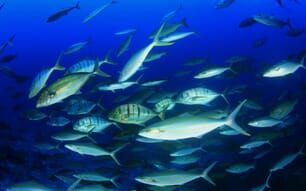The ILO report Employment Practices and Working Conditions in Thailand’s Fishing Sector features interviews with 596 fishermen, the majority of whom are migrants from Myanmar and Cambodia, it exposes abuse onboard fishing boats, with 17.3 per cent of the fishers questioned testifying that they had been threatened by their employer, the captain, a supervisor or a co-worker and 101 of the respondents (approximately 17 per cent) recounting that they had worked against their will, unable to leave for a variety of reasons.
The report concludes that many of the problems faced by fishers are compounded by a lack of employment contracts; 94 per cent of those surveyed did not have a written contract. As such, working hours and the terms of payment, including the method for calculating pay (usually incorporating a share of the sale of the catch), frequency of pay and deductions, are not clearly defined. Other contributing factors include the irregular status of migrant fishers, limited monitoring by the labour inspectorate or other bodies, and the lack of any representative workers’ group.
The Environmental Justice Foundation report Sold to the Sea (May 2013) also documented severe human rights infringements, human trafficking, physical violence, forced detention and even murder in the Thai fishing industry, with testimonies from Burmese workers as young as 16 offering details of the systemic abuse.
"The ILO report substantiates our conviction that human rights abuses are widespread in the fishing industry, both in Thailand and elsewhere. The uncomfortable truth is that fish caught on such vessels has been tracked through international supply chains to the European and US Seafood markets. Fish caught by these modern-day slaves is reaching our own plates," said Steve Trent, Executive Director, Environmental Justice Foundation.
EJF is working with local activists, responsible companies, the European Commission and the US Department of State’s Office to Monitor and Combat Trafficking in Persons in order to uncover abuses and their links to international supply chains, and to highlight these issues to decision-makers who can bring about change.
"The same lack of monitoring, transparency and traceability that facilitates unscrupulous fishing operators to used trafficked workers and abuse their crews enables illegal fishing activities to take place, such as stealing from coastal countries, damaging marine environments and jeopardising the future health of fish stocks and biodiversity. EJF is working to both defend human rights and protect the environment by combating illegal fishing and human trafficking," concluded Mr Trent.



